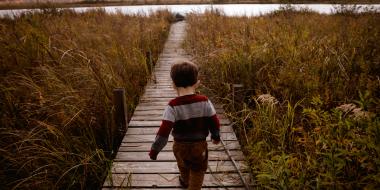There is a myth within parenting that we need to talk about. It is such a ubiquitous myth that unless you’ve done some significant soul searching about happiness and fulfillment, you probably haven’t really ever given it much thought. Like most people, you’ve fallen into this belief without even knowing there is another option. The myth is that we need affirmation and love from outside of ourselves in order to feel complete. This is an “unconscious” approach to relationship and it stands in contrast to a “conscious” approach, which at the core has two very important components.
The first component in conscious relationship, perhaps counter-intuitively, is the understanding that healthy relationship always starts with a focus on self. When you can know yourself as whole, complete, and innocent, then you are freed to actualize the second component. This is when you get to focus on the other person in the relationship, in turn recognizing them as complete and innocent.
What does this have to do with parenting? Everything.
What does “whole, complete, and innocent” mean?
When things get difficult, choosing to orient yourself within a framework in which the individual in question is seen as whole, complete, and innocent can help keep you grounded. Believing that each person, in each moment of their lives, is doing their very best and does not need fixing or changing (is whole/complete), frees us from getting caught up in fear-based narratives about the meaning of their actions, what else could follow the actions, and how we must fix it. When our children blunder, if we choose to see that they are full of good intentions and desirous of the positive (innocent), we are then able to swiftly and capably guide development with love, exactly as nature intended.
Conscious relationship with adults
The depth of consciousness in your relationship with your children determines whether you truly grow them up or get in the way of their journey. In conscious relationship, you need nothing from your child. At all. You don’t need their love, good behaviour, or good performance at school. And still, you can be abundantly happy in your life. This doesn’t mean you sit down and armchair parent, leaving them to figure it all out themselves. Quite the contrary. It does mean that you completely shift your expectations of your relationship with your child, which will utterly transform both of you.
In order to make sense of the difference between a conscious and unconscious parent-child relationship, you can start by thinking about how you conduct an adult relationship. For example, imagine a relationship with a spouse. In an unconscious relationship, you will need your spouse to behave in certain ways, be a specific kind of partner, fill a predefined role, and deliver on certain outcomes. If they don’t fulfill your expectations you will be unhappy in the relationship and consequently in life. You will either end the relationship or live within it miserably.
In a conscious adult relationship, you need nothing from your spouse. Instead, you find contentment in the complete acceptance of self. You see yourself, no matter what, as whole and complete and innocent. You identify yourself as capable and as living out life exactly as required for your own growth to unfold. This restful acceptance of self frees you to then accept the same for your spouse. Whether they remember to take out the garbage, bring you a cup of tea, say thoughtful things, or not, you are happy. For your happiness is an inside job.
Conscious relationship comes from seeing the other—your spouse, your boss, your friend—as on their own life path, one which they can capably navigate, just as you are. All of this is playing out within the context of relationship, and relationship is the catalyst that spurs on your (and their) journey. That is the real purpose of relationship: that it gives you opportunity after opportunity to grow yourself up. Only then can you feel what it is to be restfully happy.
Your child owes you nothing
In parenthood you are thrust into arguably the most intimate of relationships. The myth is that this child’s love will make you happy. However, in a conscious relationship you do not need to be made to feel happy. It may be a lovely by-product of the bond, but it cannot be a need. Rather, you understand that you can only find happiness within yourself, and your child has come along for the singular purpose of granting you another host of opportunities to grow yourself up, creating a context for ongoing fulfillment.
If you’re living in the fog of the myth, you will expect your child to deliver on certain things in order for you to feel okay about how it is all going. You will want your child to love you, behave well, achieve, and grow in certain ways to confirm that you are doing a good job and prove your worth as a parent—as a human even. In unconscious relationship, if your child is not providing the proof, you get angry about the perceived deficiency, the unfairness, the apparent affront to your efforts. You forget that this is the gift of parenthood: The chance to cultivate happiness from the inside and grow from the experience.
Unlike in your relationships with other adults, there is a hierarchy to the parent-child relationship which has your child looking to you to be their captain on this excursion through life. While you have no needs of your child, your child’s dependence does have him needing a lot from you. So, when it gets difficult with children, it doesn’t mean you just idly stand by knowing everybody is living out their journey. Rather, it means that you step in and step up. You are the leader. With love, you define the boundaries, call the appropriate shots, create the rules, and navigate the rough waters. Your child may be angry or say they hate you for it but remember: you need nothing from them to define your value.
The psychologist, Dr. Carl Jung said, “The greatest burden a child must bear is the unlived life of its parents.” If you live unconsciously, believing how hard or unfair it all is for you, or that your child “owes” you, you are doing just that—foisting the burden of your unlived life upon them and perpetually dangling your child over an abyss of stagnating maturity. Within conscious relationship, you see that your growth is gifted to you by your child. And as you grow, you are ultimately available to facilitate their growth.
A personal story about conscious parenting
It is my heartfelt intent to grow my children up with consciousness. But even with my background, this is not a perfect path for me. I am no longer married to the father of my children. Part of my journey since this transition has been navigating it for them so that they are able to grow feeling loved and secure. It hasn’t been a straight line and one son has struggled more than the other. I have had moments of falling into the trap of believing I need to “make him happy”. I “owe him” some respite. He “can’t cope” with the normal rules or boundaries so I should “cut him some slack”. Remember that part about finding him “whole and complete and innocent”? My moments of falling into unconsciousness did not have me landing there for my son.
Heading down that rabbit hole, I “eased up”. But not with the kind of energy and spirit born of safekeeping but rather born of fear. What if it is too much for him? What if his sensitive soul drowns in this? What if he hates me for it? What if we’ve ruined him? These thoughts live deep inside and then insinuate themselves into my psyche, unannounced and unbidden. This is when I become unconscious as a parent.
My easing up did not serve him—it actually made things more difficult because he wasn’t assured in the expectations or the rules. Not knowing any firm boundaries, he overstepped. Several times. He went through the text messages on my phone, my purse, and my wallet. And, the final straw, he opened a private piece of mail containing sensitive information not meant for his eyes.
I let him know he had crossed the line, but without firm conviction. Deep down I was still worried about upsetting him too much. Worried about him being angry with me, since he was already angry. Worried about him sinking, because hadn’t he been through enough? In conscious relationship, there would be no worry. There would be consideration born of love and compassion. And there would also be an unequivocal defining of the boundaries.
And so, with the loudest of the “gifts” he had offered to me as his parent, I realized I was operating from a place of unconscious need. I had big waves of roiling anger and hurt and upset pass through me. That was when I knew I had fallen into the hole of unconsciousness. I needed his love, his approval, the belief that he was okay, and I viewed him as incapable of that without my indulgence. I stayed in that hole long enough to mine the gold in it. I acknowledged all of that within me. I accepted the place that it came from. And I found myself once again whole and complete and innocent. To accept the gift my son had offered me. And then I emerged.
How do I consciously parent?
I asked the question, “What do I want?” and I found the answer. I want my son to learn to respect others. I know my son, so I know that developmentally and otherwise he is capable of that. I took back the pointing finger of blame and went inside to grow myself. It is at that point that exactly how I was to do this for my son was no longer a question. From a place of serenity—the place where I saw myself as whole—the answer presented itself. And I stepped in.
I stepped in with an energy that was all at once full of love and ferocity—“the great mother”, who loves intensely and guides powerfully. Late one evening, demanding an explanation for the contents of the mail he had opened, I seized the moment. Listen for the firm energy, the lack of fear in outcome, and especially the continued message of relational connection throughout. Importantly, the response begins and ends with unmistakable love.
“You are my lovely boy. You can never do anything to change that. And, you opened mail that was not yours. You know that this is not the first time you’ve made a poor decision around that sort of thing. My phone. My wallet. My purse. My mail.
The focus here is not that I owe you an explanation. I am your parent my love. I owe you no explanations. And that is final. The focus rather is that you overstepped and now you must make it right. So while I do not owe you an explanation, you do owe me one.
You will figure out how to make sure you really understand what the problem in this is. You will find a way to avoid making this same kind of mistake in the future. You may not be in other people’s things. You will show me what it is to respect others around you.
And, I love you. I love you more than all the stars in the sky. I love you more than all the grains of sand on all the beaches. I love you more than all the hairs on all the bears. You are my boy.”
I could not find him whole and complete and innocent until I found that within myself. And it wasn’t until this was taken care of that I could step in with the guidance required. He did not need to be treated as incapable or made to feel wrong or blamed. He did need to be shown the way and have the safety of my guidance to anchor him. Remember, the purpose of his role in my life is to be the catalyst that spurs on my own journey of personal growth. My purpose is to embrace that journey so that I can grow myself AND grow him. And this isn’t the end. There will be another time. And another. And another. As with all growth, it simply means that I get to fail better next time.
In all of this, hold true to the knowledge that while your child has great need of you, you have no needs of your child. You do not need her love. You do not need her good behavior. You do not need her performance. She does need yours however. It is only in this certainty of your love and capable leadership that she can come to rest and truly grow. Just as the path to healthy relationship with another adult was only after achieving healthy relationship with yourself, the path to growing up your child is through your own growth.
And also, thank you my son.






